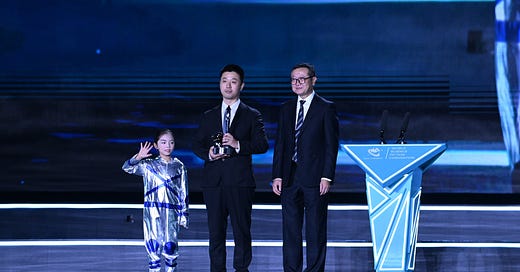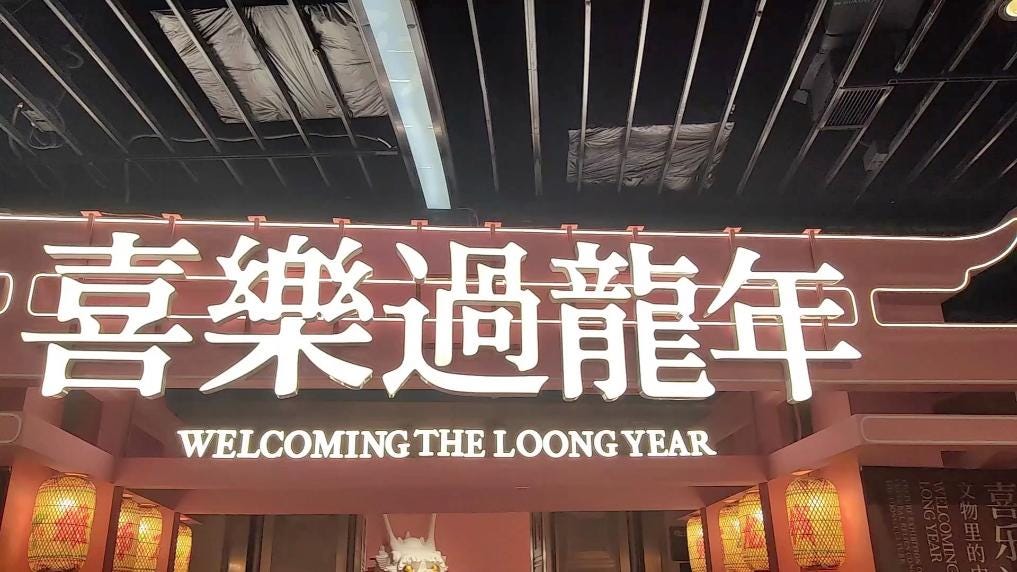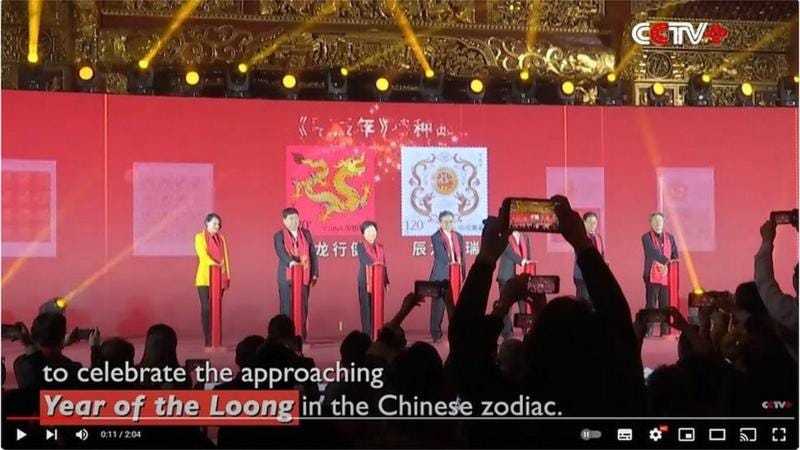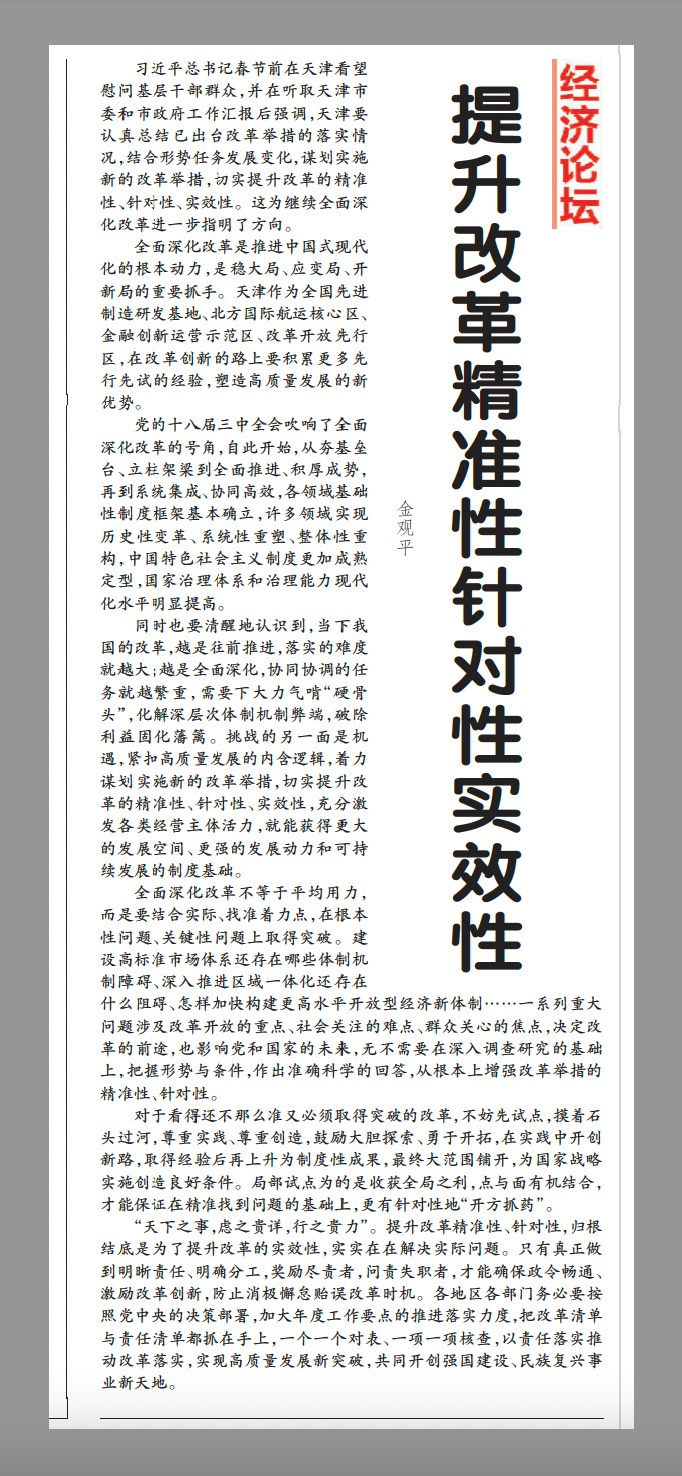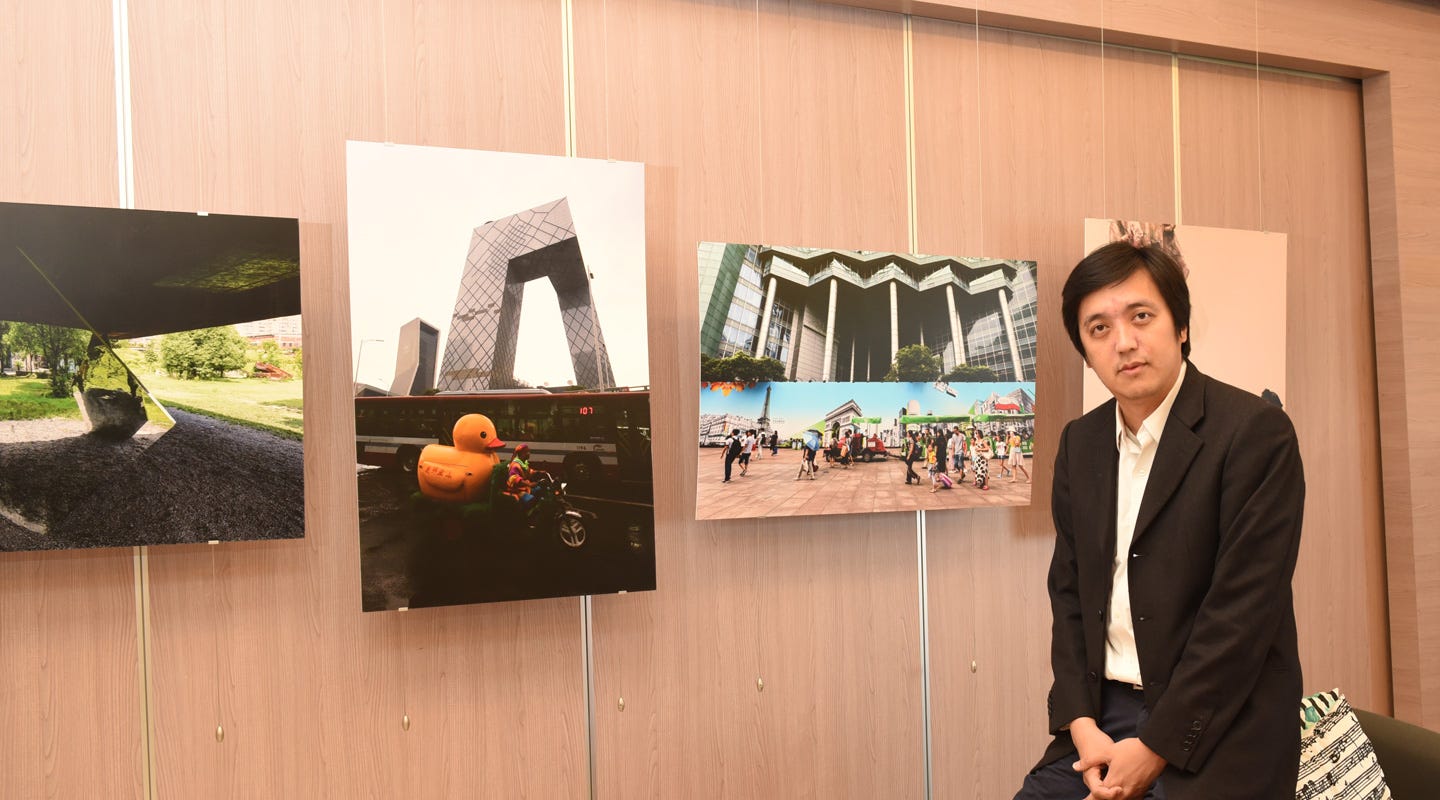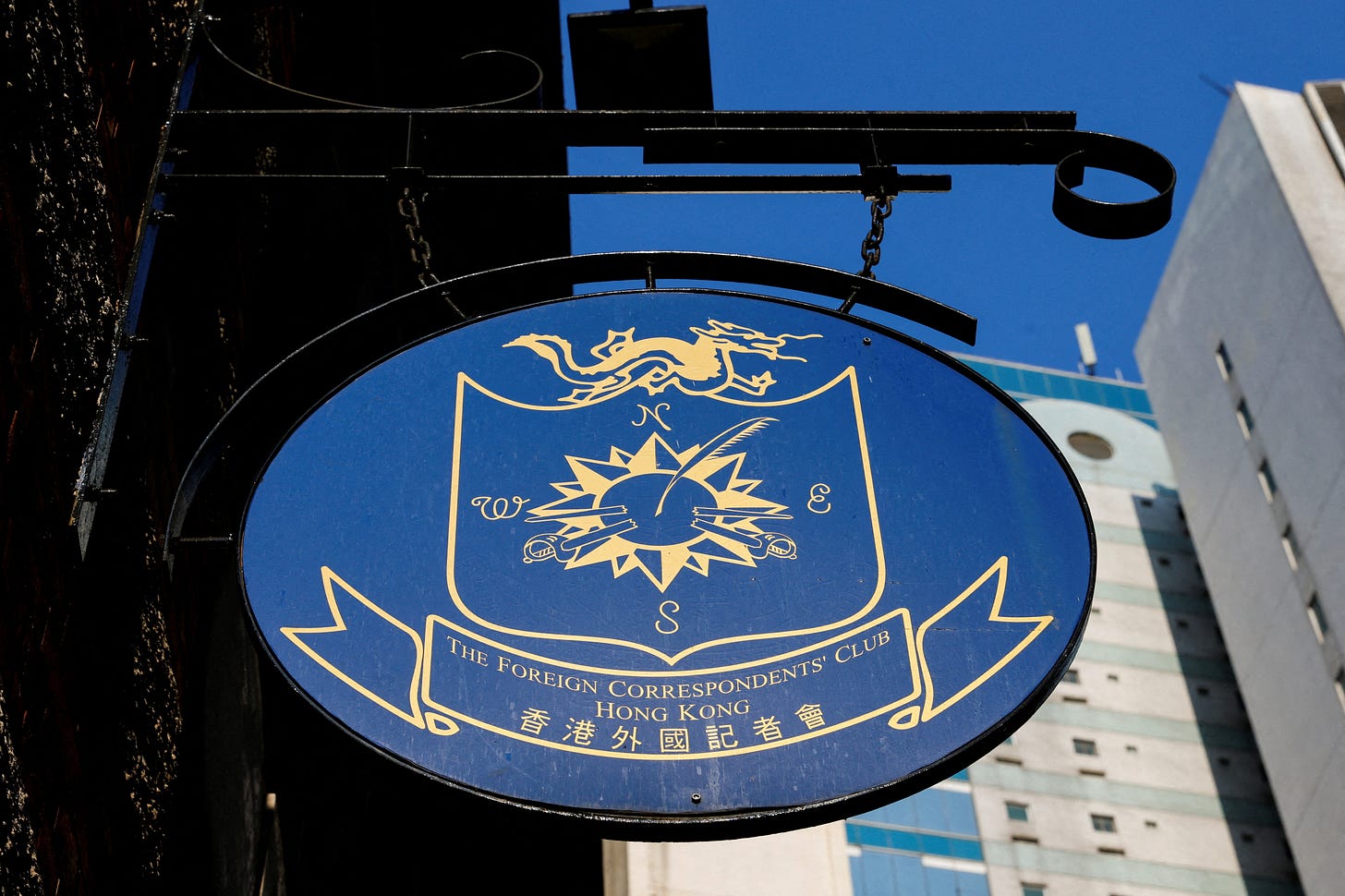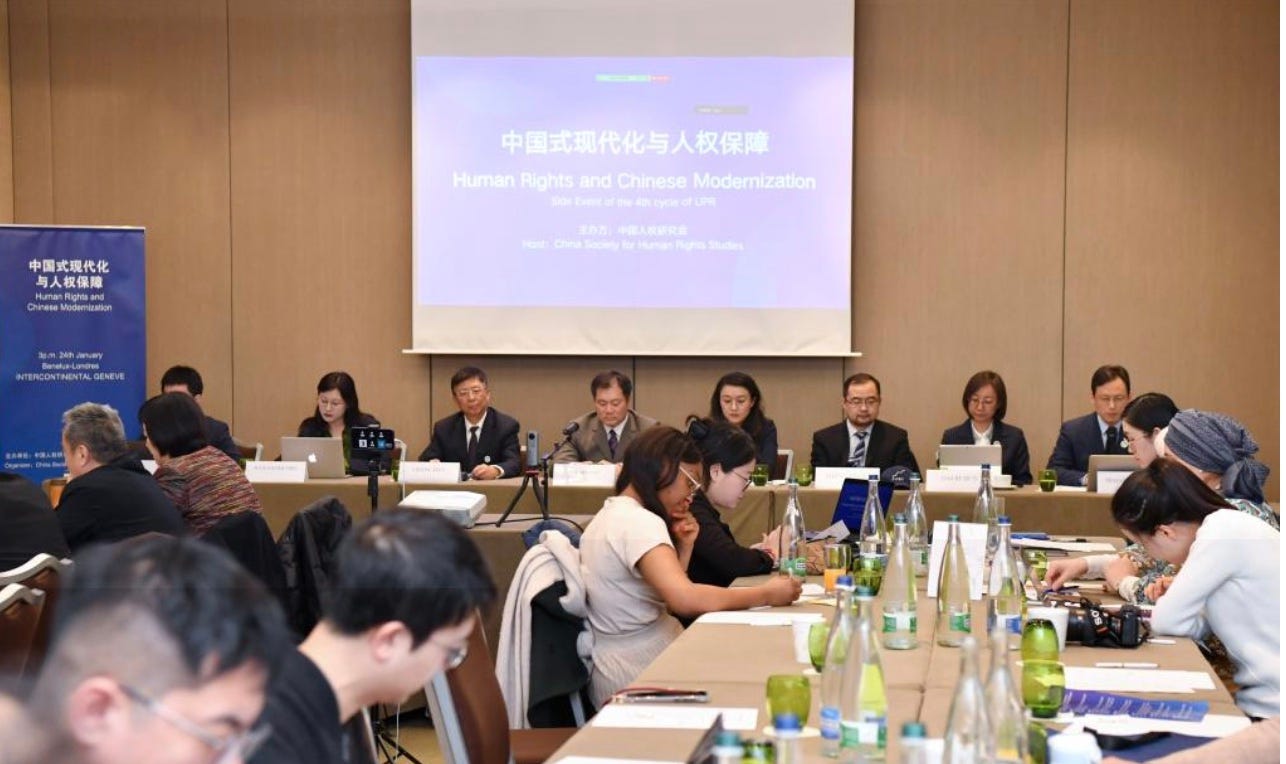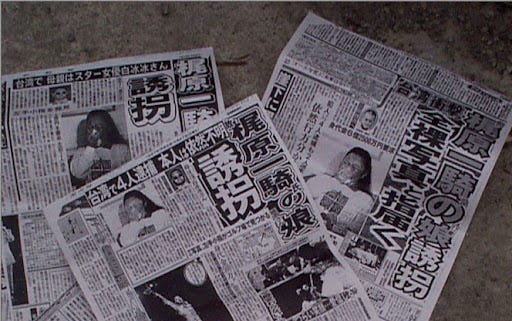Lingua Sinica Newsletter, 22 Feb
News, analysis, and commentary on Chinese-language media from the PRC and beyond.
Welcome back to Lingua Sinica:
Happy Year of the Dragon! Or perhaps we should say “loong” — more on that below. This year, we dragons are advised to take things extra carefully, but if there’s a through-line to this year’s inaugural newsletter, it’s the necessity of risk-taking.
When I caught up with CUHK’s Francis Lee in Hong Kong (see “Quote/Unquote”), he emphasized how the legal gray area in Hong Kong under its national security regime has become so huge it’s impossible to avoid. Journalists in the city are learning to be a bit more like their intrepid colleagues up north, mastering the delicate art of taking calculated risks to defend the sacred ground where their professional and personal ethics can still be practiced.
In the same week, the Hugo Awards fiasco (see “Storytellers”) provided masterclass on how (poorly) calculated risk can backfire. The prestigious sci-fi prize decided to hold their annual ceremony in China without, apparently, appreciating any of the political implications of this choice — and then opted, many allege, to voluntarily censor their awardees to appease Communist Party leaders and thereby avoid any risk.
It seems like the weight of political priorities in China is still underappreciated by some beyond its borders. Well, a new report by the U.S.-China Economic and Security Review Commission (USCC) makes that even clearer. It looked at how China is trying to control global opinion on sensitive issues through its extensive censorship apparatus and is developing technologies like advanced AI for this purpose. The report, "Censorship Practices of the People's Republic of China," says China has invested heavily in "international public opinion guidance" and attempts to hijack discussions on foreign social media platforms.
Techniques and approaches are always evolving, and CMP and Lingua Sinica monitor these — like the more recent trend of empowering regional/provincial international communication centers (國際傳播中心). Be sure to follow us on Substack, Twitter/X, and Bluesky, and check in on our website for more granular insights into these tactics.
Ryan Ho Kilpatrick
CMP Managing Editor
FLASHPOINTS
A Quiet Crisis in Kinmen
The accidental drowning last week of two Chinese fishermen in waters off the Taiwanese island of Kinmen (金門), barely three kilometers from the Chinese coast, had the makings of a serious cross-straits incident.
Chinese netizens across multiple social media platforms have demanded various forms of retaliation for the incident, in which the fishermen’s speedboat capsized while attempting to flee from Taiwan’s coast guard, which said they had trespassed to fish in waters just 1 nautical mile off Kinmen. Details as to whether a collision occurred remain hazy. The responses suggested by web users have ranged from an official explanation by Taipei to catching and killing the coast guard “murderers” involved to settle this “blood debt.”
“We treat them as compatriots, they treat us as enemies,” netizens growled on CCTV’s short video coverage on the app Kuaishou.
Beijing’s official Xinhua News Agency portrayed the fishermen as hard-working and honest men who were within their rights to fish in Taiwan’s territorial waters and fell victim to the Taiwanese coast guard’s “inhumane” and aggressive behavior. They compared what they called Taiwan’s “cold-blooded” treatment of Chinese fishermen to the PRC'S supposed compassion towards Taiwanese fishermen.
Other state media have stressed the human element of the tragedy, covering the Quanzhou Red Cross as it accompanied the families of the fishermen to Kinmen to inspect their relatives' remains and bring back the boat’s two surviving crew members.
Actions Speak Louder Than Words
Despite claims in the People’s Daily, Xinhua, and Global Times that “strong indignation” was simmering nationwide, China’s official response so far has been more reserved. The topic has not gone viral or featured on the hot search lists of Baidu or Weibo, and the Ministry of Foreign Affairs refused to comment at their regular press briefing, saying it was not a question about foreign affairs. The incident garnered only a tiny piece on page 4 of the People Daily’s February 19th edition.
On the other hand, the PRC coast guard ported at Xiamen has been stepping up patrols around Kinmen, and has boarded Taiwanese vessels in nearby waters — all while Xinhua sought to discredit Taiwan’s sovereignty and the “so-called” restricted waters around the island, laying the blame for the incident at the feet of Taiwan’s recently reelected Democratic Progressive Party (DPP).
These actions, though relatively minor in isolation, add up to a substantial challenge to the uneasy peace that has reigned in Kinmen since 1949, when an unsuccessful invasion of the island halted PRC plans to “liberate” Taiwan itself. Challenging Taiwan’s rights in the waters immediately around Kinmen resembles the “salami-slicing tactics” used by China to erode the status quo and encroach bit by bit onto territory it claims its own — a familiar pattern in both the Taiwan Strait and the South China Sea.
“China’s attempts to blur the lines of Taiwan’s restricted waters is worrisome, as this could lead to the expansion of Chinese law enforcement,” wrote the DPP’s Director of International Affairs Wen Lii (李問) on X (Twitter). “Such actions risk unintentional clashes and an unnecessary escalation of tensions in the Taiwan Strait.”
Illegal fishing is a persistent problem in Kinmen and Matsu, Lii wrote, referring to Taiwan’s other “frontline island” where he previously served as DPP director: “China should view this unfortunate incident as an issue of law enforcement that the two sides can work on together, in a responsible way.”
But instead of treating the incident as an isolated tragic accident, the CCP has chosen to exploit it as an opportunity to quietly push ahead its unification agenda and discredit the DPP. It was “a gift from the sky” for them, said Ma Zhenkun (馬振坤), a professor at the Institute of Military Affairs at the School of Political Operations at Taiwan’s National Defense University.
NEWSPEAK
It’s Going to be a Loong Year
Dragons years have something of a special resonance in culturally Chinese areas, where such years tend to drive minor baby booms as parents strive to birth their young ones under the most potent and auspicious of the 12 zodiac signs. But if PRC media have their way, this dragon year will be extra-special for another reason: it will drop all references to dragons, and instead mark the dawn of the very first “Loong Year.”
Like recent official efforts in China to drop use of references to Tibet in favor of the romanized Chinese “Xizang,” which we covered in the last Lingua Sinica newsletter, the rise of “loong” is a push to Sinicize the language of foreign messaging.
Across PRC state media, there has been a concerted push in recent weeks to promote the use of “loong” instead of “dragon” to refer to the mythical beast「龍」in English. CGTN, the International arm of state broadcaster CCTV, aired a celebration of the “Loong Year” (née Year of the Dragon, 龍年) with a “loong dance” (née dragon dance, 龍舞) and festive mascot “Loong Chenchen” (龍辰辰). In lockstep, official government news agency Xinhua, the Communist Party’s English-language China Daily, and the Global Times, published by the Party’s mouthpiece People’s Daily, all joined the loong march.
The official reasoning is this: dragons, in European folklore, are fire-breathing, man-eating, treasure-hoarding monsters; in Chinese mythology, they are powerful but benevolent and wise, and most closely associated with water. This itself, of course, papers over nuances: Some dragons in Western stories are wise, kindly, and misunderstood, while some Chinese dragons are malevolent and petty forces of destruction, prone to flooding vast swathes of the empire when insulted by a single mortal.
Playing the Loong Game
Ever alert to the wants and needs of Beijing, Hong Kong Chief Executive John Lee Ka-chiu (李家超) was quick to change gears. In a New Year’s address, Lee said, “We’re all here to welcome the Year of the Loong,” before adding, “people usually call it the dragon.”
Many in Hong Kong — like self-exiled cartoonist Ah To (阿塗), pictured below — snickered about the awkward, seemingly shoehorned-in attempt to get in line with the latest mainland talking point. But pro-Beijing media were not amused. “Anti-China elements have tried to turn this matter into a joke,” railed the online news outlet HKGpao (HKG報), which has staked its claim as a patriotic media, “but their laughter only reveals their own foolishness!”
As for whether or not the dragon boat will soon become the “loong boat” in China’s state media, only the approach of the Dragon Boat Festival on June 10 will tell. If so, one highlight of this summer’s Loong Boat Festival could be verbal races between references to traditional, long wooden dragon boats (大龍), or alternatively to “long loong boats.”
REDLINES
Commanding a Sense of Economic Urgency
China’s CCP-led media most often work as staid standard-bearers of what the Party refers to as the “mainstream” view — the leadership’s prevailing consensus on policy and ideology. From time to time, however, as the situation warrants, Party media may also serve as whips, spurring on errant actors within the system or stinging activist or dissident elements outside.
In a commentary published on its front page on Monday this week, and attributed to “Jin Guanping” (金观平), the Economic Daily (经济日报), a newspaper directly under China’s central government and overseen by the Party’s Central Propaganda Department, sought to spur China’s officials into action to address deep-rooted problems facing the country’s economy, which in recent months has faced a rocky recovery. In its frankness on the need for urgency, the commentary said that China must “avoid inaction and slackness that squander the opportunity for reform,” and that “those who do their job properly should be rewarded, while those who fail must be held accountable.”
The commentary comes as observers await a key Third Plenum of the 20th CCP Central Committee that has been unaccountably delayed. The meeting, which generally takes place every five years, has focused market expectations for new reform policies that some say are urgently needed to pull China out of its economic doldrums. On Sunday, the day before the commentary ran in the Economic Daily, Premier Li Qiang (李强) presided over a meeting of the State Council and said more urgent action was needed to boost confidence.
After an obligatory lead-up that praised China’s economic achievements under the hand of Xi Jinping, spouting current concepts like “Chinese-style modernization,” the Economic Daily commentary grew more grave: "At the same time, must realize that our country faces ever more pressing difficulties as its reform moves forward; that the more we comprehensively deepen [reform]… the more onerous the task of coordination.”
Who is Jin Guanping?
Following the common practice within CCP-run media of assigning homophonic pen names to stand in for various commentary writers of “writing teams” (写作组), “Jin Guanping” is in fact not a person at all. Rather, this is a pen name comprising the characters for “gold” (金), “view” (观) and “peace” (平) that works as a homophone for “commentary with Economic Times' viewpoint” (经济日报观点评论). This clues us in to the fact that this commentary was written by a high-level writing team within the CCP-run newspaper that is meant to represent the official view of the paper itself. For more on official pen names and their unique role in Chinese politics, read CMP’s “Pen Names for Power Struggles.”
CHAIN REACTIONS
A Bridge Between Italy and Xinhua?
Based in Rome, the bilingual magazine Cina in Italia (世界中国) positions itself as an outlet facilitating exchanges between China and Italy. Through its print and online editions, it says, it “assumes a role as a bridge between the two cultures.” The outlet was first launched in 2001 under the title Life (生活), and according to a profile of its founder, Hu Lanbo (胡兰波), was aimed at members of the Chinese diaspora grappling with legal challenges and problems of social integration in Italy.
Whatever its original intentions, a closer look at Cina in Italia today suggests that the outlet now serves primarily as a vehicle for official CCP positions in Italy. The bulk of the content at Cina in Italia consists of reports like this one, sourced directly from China’s official Xinhua News Agency, about the economy and tourism. Reports not explicitly labeled as being from state media, like this one on the digital economy, seem to closely follow official news stories from sources like the Global Times and the State Council Information Office.
Talking to the West: Like Strumming a Lute for an Ox
While she has long claimed that her aim in publishing Cina in Italia is to facilitate cultural dialogue and connection, founder Hu Lanbo has elsewhere said openly that her goal is to “tell China’s story” — a direct reference to Xi Jinping’s 2013 external propaganda strategy — and to “transmit China’s voice to mainstream media in Italy.”
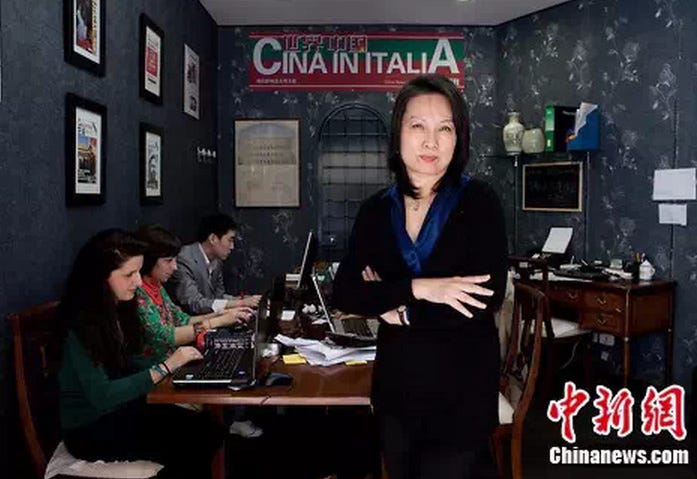
In the May 2020 edition of her magazine, coming amid the pandemic, Hu echoed the official position of the CCP on soft power as she voiced her anger over criticism of China’s handling of Covid, and she bemoaned the “longstanding grasp of international public opinion in the fist of the West.” She even suggested, despite her language about bridge building, that communication between China and the West was impossible: “China and the West are in different worlds in terms of ideologies and social systems, and China’s discourse power is so weak! To use China’s civilization to tackle the public opinion fortress of the powerful West is like strumming a lute for an ox!”
Since 2010, the print edition of Cina in Italia has been published in cooperation with China Newsweekly (中国新闻周刊), a news magazine under the official China News Service (CNS). CNS is run by the United Front Work Department (UFWD) of the Chinese Communist Party, the agency responsible for coordinating many of China’s influence operations overseas, particularly among Chinese diaspora communities.
Stay tuned to CMP for Dalia Parete’s in-depth profile on Cina in Italia and its role in Italy.
QUOTE/UNQUOTE
The Risky Business of Journalism in Hong Kong
Once a regional beacon of press freedom, Hong Kong’s media landscape has become barely recognizable under the harsh limitations imposed by the national security law (NSL) in 2020. And while journalists in the city have struggled to adjust to this new normal, there is a fresh chill on the horizon as the government looks to implement Article 23 of the territory’s Basic Law later this year with an more wide-ranging law on national security.
To learn more about the rapidly changing situation for the press in Hong Kong, we recently caught up with Professor Francis Lee at the Chinese University of Hong Kong’s School of Journalism and Communications. Here’s an excerpt from that discussion, which you’ll be able to find in full on the China Media Project website in the coming days.
Lingua Sinica: You said recently that media in Hong Kong have reached a “new balance” in how they operate under Hong Kong’s national security regime. But now it feels like that newfound balance is already being thrown off yet again by all the uncertainties around Article 23. Do you think that's the case?
Francis Lee: That's the difficulty of speaking about these things. When journalists ask me these questions, I say that this only applies at 11:52 A.M. on February 15th. Don't quote me on this one month later. Any equilibrium is bound to be short-lived.
If you're living in Hong Kong day in and day out, I think this is part of the social psychology of adaptive resilience. Something happens and then you feel bad for two weeks and you don't know what to do and then after two or three months you kind of adapt to the environment. After a few months, it seems like you can do certain things. It seems like you are not getting yourself in trouble. You look at your peers and they are also doing OK.
At that moment, you feel like maybe there is an equilibrium. Right now in Hong Kong, we all know deep down that any so-called equilibrium can be thrown off-balance tomorrow. No matter how you feel, that sense of being in equilibrium is something that you develop after the fact, after six or nine peaceful months.
Right now, of course, it's very different, because you don't know what the law will be. It depends on how you look at it. Like a lot of things these days in Hong Kong, it's about expectation management. I think that's how a lot of organizations in Hong Kong have been doing things since 2020. It depends on how experienced and how well-established these news or civil society organizations are. The more systematic, more well-organized, and more well-established organizations immediately do an internal risk assessment to study the stipulations as soon as they come out and then compare it with their own work to assess where the risks are, whether certain adjustments are needed, and so on.
LS: So this is a process media organizations will likely be going through right now with Article 23?
FL: For me, the most dangerous law for the news media is not necessarily Article 23. Like before, in the past two years, we had the NSL and then we have the common law offense of sedition. I think the general idea among a lot of journalists and a lot of media organizations is that they have been worried much more about sedition than the NSL.
It's not easy for journalists to run afoul of the NSL as long as you stay away from Hong Kong independence and foreign funding, and follow a few other simple rules. That requires a bit of self-censorship, but at least there are ways for you to stay away from that. But sedition is different because anything that arouses hatred against the government can potentially be seditious. And basically, that means that whenever the news media tries to perform its watchdog role, it's potentially in the gray area already. Of course, the sentence for sedition is at most two years in prison, which is nothing compared to NSL. But at the same time, it's much easier for the news media to run afoul of.
When [these laws] are established, Hong Kong media just have to do the risk assessment again. There might be additional lines of self-censorship that they have to implement, but I believe they will find some way to survive. I think the legislation more journalists will be worrying about — or have been worrying about — deals with “fake news laws,” which the government has said they are studying but which we still know very little about. [State secrets] might require you to, again, to self-censor on a number of topics, but you can still avoid it. But disinformation, depending on how it’s defined, could be much harder to avoid.
LS: You just spoke about how there's this constant process of risk assessment and management and you have been trying to advise people on how to manage that process. Probably the best example we have of how not to do that so far is the Foreign Correspondents Club, which scrapped the Human Rights Press Awards after, they say, lawyers advised it would be risky, and they decided they had a responsibility to avoid risk. But isn’t some degree of risk unavoidable for journalists in Hong Kong now?
FL: I tell people that my legal advice is not to seek legal advice. When you ask for legal advice, a responsible lawyer will tell you that the safest way is not to do anything. In a sense, they’re doing their jobs and I respect that. The problem is that the answer [to whether it’s perfectly safe to do something] is always going to be “no.”
Look out for our full interview with Francis Lee later this week on CMP.
STORYTELLERS
Hugo Award Headaches
To the surprise of no one who understands the Chinese leadership’s obsessive control of ideas, news broke last week that a prestigious international book award was subject to censorship when held in China last October. File 770, a science fiction blog, revealed in a special report how the selection panel of the Hugo Awards in Chengdu had obeyed local laws and regulations, vetting the eligibility of finalists based on their stance on sensitive political issues. The blog also found evidence that Sichuan’s propaganda bureau had conducted “strict checks” on works at the convention.
For those paying closer attention, the red flags had flown at least six months before the awards were held, as rules published by Chengdu WorldCon said content considered for awards would only include works and individuals “that comply with local laws and regulations.” In China, local laws and regulations always abide by the political discipline of the Chinese Communist Party. Foreseeing trouble did not require a vivid imagination.
In media coverage outside China, the most obvious focus has been those writers excluded by Chengdu’s skewed process — including the likes of R.F. Kuang, Neil Gaiman, and Paul Weimer. But what about those writers who were boosted?
For insights into how the Hugo Awards in China might have been impacted by political priorities, read more in our latest China Media Project piece: “When Science Fiction Meets Political Fact.”
GOING GLOBAL
Are NGOs non-governmental if they are directly run by the Chinese Communist Party?
In the latest United Nations Universal Periodic Review (UPR) in Geneva, China's human rights record was the focus of scrutiny. But while international human rights groups highlighted concerns like atrocities in Xinjiang and erosion of rights in Hong Kong, China staged parallel events through supposedly independent organizations that sought to downplay these issues and promote what critics have called “rights-free development.” These side meetings, or bianhui (边会), included a forum on “Chinese-Style Modernization and Human Rights Protection,” hosted by the China Society for Human Rights Studies (CSHRS), which aimed to portray a rosier picture of China's human rights landscape as it elevated the political concepts of Xi Jinping.
As we demonstrate in our latest Going Global report at CMP, these regular side events and other forms of engagement organized by front groups like CSHRS are central to China's strategy to manipulate the global human rights narrative. Despite claims of independence, these organizations are extensions of the CCP's propaganda machinery. CSHRS, for example, is directed by the Central Propaganda Department through another ostensibly independent foundation. These groups promote China's agenda while undermining the role of civil society in the UN's human rights work, a strategy that not only distorts the global discourse on human rights but also disempowers individuals and communities by erasing their voices from the conversation.
Read our full analysis here.
DID YOU KNOW?
The Killing Spree that Transformed Taiwanese Media
Today, Taiwanese media operate under a strict set of decency regulations. Alcoholic drinks, cigarettes, and betel nut must be blurred on-screen. So too must even minor acts of violence. During his stint working for Taiwanese TV, Lingua Sinica editor Ryan Ho Kilpatrick was obliged to blur screenfuls of footage from the Hong Kong protests — because viewers had to be protected from the sight of jostling crowds.
But things weren’t always this way. Contemporary squeamishness, as patronizing as it can sometimes seem, is inarguably an improvement on the chaos that used to reign in Taiwanese media. The tipping point for the industry came in 1997, when press coverage of a tragic kidnapping and murder case endangered lives, outraged the nation, sparked an international incident, and precipitated a slew of new rules.
This was the Pai Hsiao-yen Murder Case (白曉燕命案). Sixteen-year-old Hsiao-yen, the daughter of Taiwanese TV host and actress Pai Bing-bing (白冰冰) and Japanese author Ikki Kajiwara, was abducted on her way to school in New Taipei’s Linkou District in April that year. Her kidnappers demanded an astronomical ransom from her mother and threatened to kill Hsiao-yen if the police were involved — a risk that Bing-bing ultimately decided she had to take.
Police requested a 12-day information blackout for the media, but within hours Hsiao-yen’s kidnapping had already become front-page news in two of the nation’s biggest papers. Authorities spent a small fortune trying to buy every copy of the papers but the news was already out, and other outlets soon followed their lead.
We’ll be exploring this case more in an upcoming piece for Lingua Sinica. Stay tuned.


